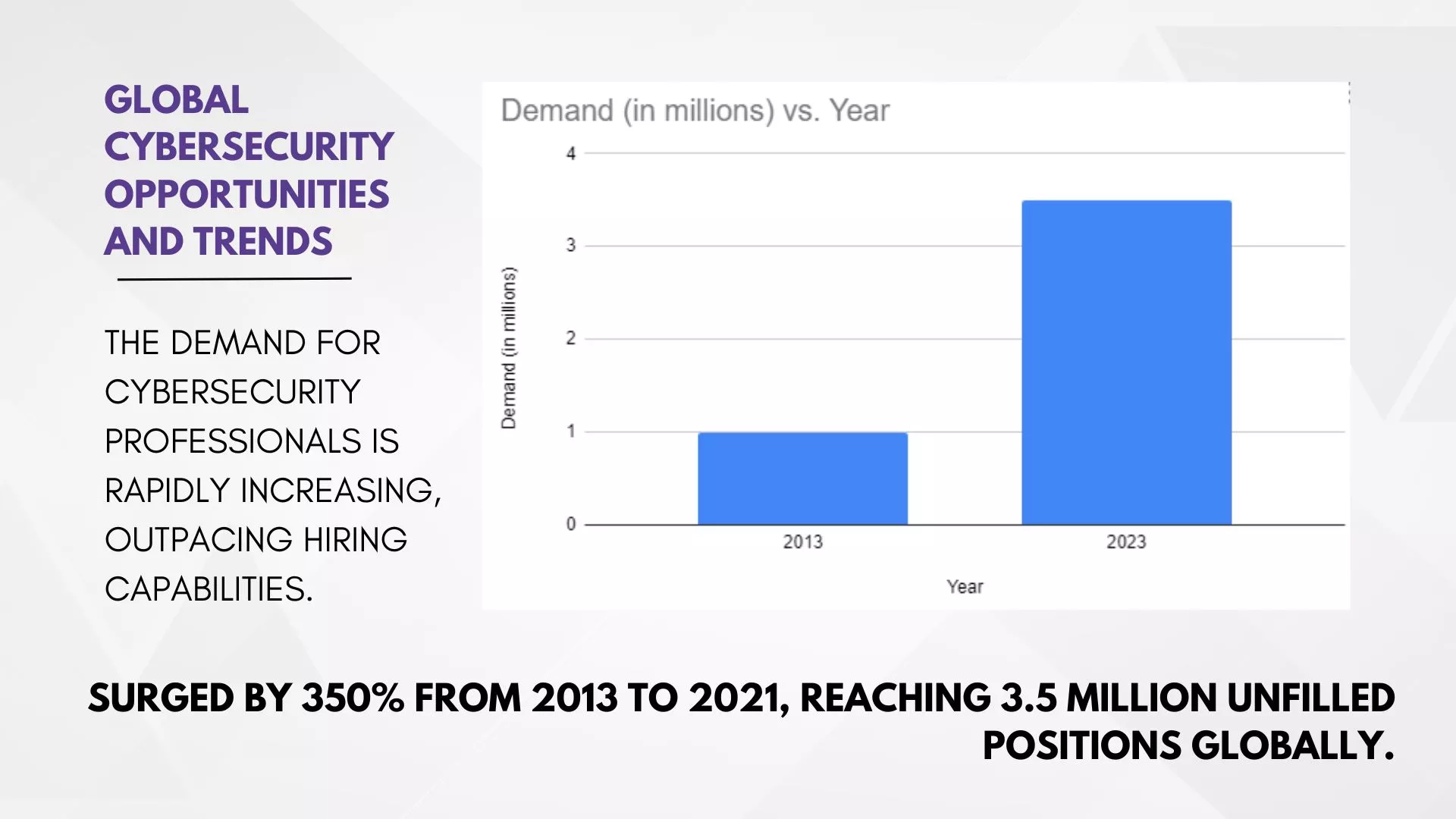Impressively, 65.7% of people globally use the internet daily in 2023. This figure illustrates the extent to which the online world has permeated our everyday existence. With an annual increase of 6% from 2018 to 2023, the number of internet users has continuously increased over time. That brings us to: Is cyber security a good career? Yes, it is.
You see, the continuous growth indicates the constant expansion of the digital world. But what about our protection from all the threats on the World Wide Web? This tells us why is cyber security important—which is the process of safeguarding online identity from dangers. But this isn’t enough to determine if you want a career in cyber security.
Keep reading to discover a lot more about a career in cyber security.
| Find in This Blog:· What Is Cyber Security?
· Why Is Cyber Security Important? · Popular Cyber Security Career Paths · Available Cyber Security Job Titles and Pays · What Makes Cyber Security a Good Career? · Disadvantages of Working in Cyber Security · Tips for Pursuing a Cyber Security Career · Skills Need for Cyber Security Expert · Demand for Cyber Security Professionals Based on the Country |
What Is Cyber Security?
Cybersecurity is like a shield for our computers and gadgets. Its main job is to keep bad guys, called hackers, from sneaking into our digital world and causing trouble. Imagine it’s like a high-tech shield that protects important information and keeps everything safe.
So, what does it actually work?
Well, when you play games on your tablet, send messages on your computer, or even when you use your phone for work, cybersecurity is there to make sure no sneaky hackers try to steal or mess up anything.
| Cybersecurity is the protection of computer systems, networks, and sensitive data from unauthorized access or damage. Experts in this field prevent and address cyberattacks, collaborating with governments, businesses, and healthcare to ensure information security. |
Cybersecurity is vital, like locking your front door for home safety—it protects online information. Growing computer and internet use increases demand for these digital defences.
3 Main Concerns: Why Is Cyber Security Important?
As technology continues to advance, the role of cybersecurity professionals becomes increasingly necessary in protecting our personal and financial data from evolving cyber threats.
Let’s explore the critical role of cybersecurity in protecting personal information, financial data, and other sensitive information from cyberattacks and other prominent threats.
1. Protection of Personal Information
Cybersecurity plays a vital role in protecting our personal information and maintaining the privacy and confidentiality of sensitive data. Cybersecurity professionals are essential in defending against cyber attacks and ensuring the security of personal information from potential threats.
2. Prevention of Cyberattacks and Information Leaks
Cybersecurity is crucial in preventing cyberattacks that can lead to significant delays and leaks of information. Ransomware, a notable example, involves locking an individual’s or organization’s information until specific demands, including extorted payments, are met.
Cybersecurity professionals study breaches and malicious actors to safeguard against these threats, ensuring the security of our most sensitive information and communications.
3. Increasing Demand for Cybersecurity Professionals
The growing need for secure computer infrastructure, software, and networks has led to an increased demand for cybersecurity professionals. These experts play a pivotal role in various sectors, including:
- Government organizations
- Businesses
- Healthcare
- Large retailers
They work to secure military communications, protect financial records, safeguard patient data, and ensure the security of customers’ credit card information.
What Are the Cyber Security Careers?
A career in cybersecurity can offer significant rewards and satisfaction. Additionally, you will be attending a series of roles ranging from senior to junior level and analyst to tester. Here are some of the popular career paths within cybersecurity:
Career Path 1: Security Analyst
Responsibility: Monitor and analyze security systems to detect and prevent cyberattacks.
Tasks: Investigate security breaches and recommend solutions to enhance future security.
Career Path 2: Security Engineer
Responsibility: Design and implement security systems to safeguard computer networks and systems.
Tasks: Test and evaluate security systems to ensure proper functionality.
Career Path 3: Security Consultant
Responsibility: Provide expert advice to organizations for improving their security posture.
Tasks: Assist in developing security policies and procedures.
Career Path 4: Security Manager
Responsibility: Manage a team of security professionals and develop/implement security policies.
Tasks: Ensure the protection of an organization’s assets.
Career Path 5: Penetration Tester
Responsibility: Test an organization’s security systems by attempting to exploit vulnerabilities.
Tasks: Offer recommendations for enhancing security.
Available Cyber Security Job Titles and Annual Income
Some of the highest-paying cyber security cyber security jobs and their average annual salaries:
- Cyber Security Engineer Salary :$76,789
- Information Security Analyst Salary : $87,647
- Security Consultant Salary :$91,000
- Penetration Tester Salary :$93,000
- Cybersecurity Analyst Salary : $98,350
- Security Manager Salary : $103,000
- Cybersecurity Consultant Salary : $105,000
- Information Security Manager Salary : $115,000
- Cybersecurity Manager Salary:$120,000
- Chief Information Security Officer Salary: $150,000
5 Things That Make Cyber Security a Good Career: Advantages
The field of cybersecurity is experiencing rapid growth and a significant demand for skilled professionals who can identify, respond to, and prevent cybercrime.
In 2022, the FBI’s Internet Crime Complaint Center (IC3) reported 791,790 cybercrime-related complaints in the United States alone, resulting in losses exceeding $4.1 billion.
Here are several compelling reasons why a career in cybersecurity could be an excellent choice:
1. Abundance of Cybersecurity Jobs
There is a substantial shortage of qualified cybersecurity professionals, and companies are generating new cybersecurity positions at a pace that surpasses the available workforce. Cybersecurity Ventures estimates that by the end of 2021, there may be up to 3.5 million unfilled cybersecurity jobs.
2. Cybersecurity Skills Gap
The demand for skilled cybersecurity professionals is increasing faster than individuals are acquiring the necessary expertise. Research from Frost & Sullivan suggests that the shortage of qualified IT professionals may widen by an additional 1.8 million jobs by 2022.
3. High-Earning Potential
Cybersecurity professionals are in high demand, and their salaries reflect this demand. According to the Bureau of Labor Statistics, the median annual wage for information security analysts was $103,590 in May 2020.
4. Job Security
As cybercrime continues to escalate, the demand for cybersecurity professionals is expected to rise. This ensures job security and stability for individuals in the cybersecurity field.
5. Job Satisfaction
Cybersecurity professionals play a crucial role in safeguarding organizations from cyber threats such as attacks, hackers, viruses, and malware. Contributing to the safety of individuals and entities by thwarting cyber threats can be immensely rewarding.
4 Challenges of Working in Cyber Security: Disadvantages
The field of cybersecurity offers a gratifying career, yet it presents its own share of difficulties. According to an article from Upskilled, some of the drawbacks of working in cybersecurity are as follows:
High Stress and Demanding Hours
Professionals in cybersecurity often face the pressure of working long hours and being on call 24/7 to address security incidents and emergencies.
Repetitive and Tedious Tasks
In cases where an organization’s security system is functioning optimally, cybersecurity teams may find themselves engaged in monotonous tasks, such as monitoring and maintaining the system.
Less Room for Mistakes
Given the critical nature of their responsibilities in safeguarding sensitive data and systems from cyber threats, cybersecurity professionals operate in an environment where even minor errors can lead to severe consequences.
Difficulty Keeping Up with Fast-Paced Trends and Emerging Information
The field of cybersecurity is dynamic, with ever-evolving trends and emerging threats. Professionals need to consistently stay informed about the latest developments to combat cyber threats effectively.
Despite these challenges, a career in cybersecurity offers various benefits, including lucrative salaries, job security, and opportunities for career advancement.
| Common Cyber Security ServicesCybersecurity companies provide a broad range of services, including:
· Vulnerability Assessment · Penetration Testing · Network Security · Web Application Security · Mobile App Security |
How to Start a Career in Cyber Security: 5 Tips
To pursue a career in Cyber Security, you can follow these steps:
1. Develop Core IT Skills
Before applying for your first cybersecurity role, focus on building essential IT skills. This includes proficiency in programming, networks and systems administration, and cloud computing. While a degree is not mandatory, structured training, such as the Microsoft Cybersecurity Analyst Professional Certificate, can expedite your entry into the field.
2. Gain Experience
Many cybersecurity professionals start as junior information security analysts after acquiring experience in IT. Begin in an entry-level IT position, such as a help desk technician, network administrator, or software developer.
| Stages | Positions | Roles |
| 1. | Junior Information Security Analyst | · Help Desk Technician· Network Administrator
· Software Developer |
| 2. | Cybersecurity Professional | Progression from an entry-level IT position with experience |
3. Choose a Career Path
As a cybersecurity analyst, you have various career paths to explore based on your interests and goals. Options include security engineering and architecture for those who enjoy planning and building, incident response for those who thrive on quick, strategic actions, or refining hacking skills to stay ahead of cyber threats. You can explore different career paths within this dynamic field.
4. Get Certified
Stand out in the job market by obtaining relevant certifications. Popular cybersecurity certifications include:
- CompTIA Security+
- Systems Security Certified Practitioner (SSCP)
- Certified Information Systems Security Professional (CISSP)
- Google Professional Cloud Security Engineer
To obtain these certificates successfully, you can enroll in our cyber security training in Queens.
5. Stay Up-to-Date
Cybersecurity is ever-evolving, requiring professionals to stay current with the latest trends and threats. Continuous learning is essential, and you may need to invest extra hours or be on-call to defend against evolving cyber attacks. Stay vigilant to remain effective in this high-demand field.
9 Skills Required for a Cyber Security Expert
Cybersecurity experts require a range of technical and soft skills to excel in their roles. Here are some of the most important skills that cybersecurity experts should possess:
Fundamental Technological Skills
Cybersecurity experts need a solid foundation in core IT skills. This includes a comprehensive understanding of programming languages, networks, systems administration, and proficiency in managing and securing data in cloud computing environments.
Programming
Proficiency in programming languages, such as JavaScript, is crucial. This skill empowers cybersecurity experts to develop internal systems and applications. It also enables them to implement security measures that prevent unauthorized access to an organization’s sensitive data.
Risk Identification and Management
Identifying potential vulnerabilities in both internal and external systems is a critical aspect of a cybersecurity expert’s role. These professionals need to develop effective strategies and measures to manage and mitigate these risks, ensuring the security and integrity of the organization’s digital assets.
Analytical and Diagnostic Skills
Cybersecurity experts must possess strong analytical and diagnostic skills to identify and resolve complex issues promptly. This involves the ability to analyze patterns, interpret data, and diagnose security threats or system malfunctions efficiently.
Adaptability
The dynamic nature of technology and the ever-changing landscape of cybersecurity require professionals in this field to be highly adaptable. They need to quickly respond to emerging threats, technological advancements, and evolving security challenges to effectively safeguard the organization’s digital infrastructure.
Attention to Detail
Attention to detail is paramount in cybersecurity. Cybersecurity experts must meticulously review and monitor security systems to ensure their proper functioning. This attention to detail helps identify and address even the smallest security vulnerabilities that could be exploited by cyber threats.
Communication Skills
Effective communication is essential for cybersecurity experts to convey complex technical concepts to non-technical stakeholders. Clear and concise communication helps in building understanding and support for security measures within the organization, fostering a collaborative approach to cybersecurity.
Critical Thinking
Cybersecurity experts need strong critical thinking skills to analyze and solve intricate problems. This involves the ability to assess the severity and implications of security issues, evaluate potential solutions, and make informed decisions to protect the organization from cyber threats.
Continual Learning
Cybersecurity is a field that undergoes constant evolution. Staying updated with the latest trends, technologies, and threats is crucial. Continuous learning ensures that cybersecurity experts remain equipped with the knowledge and skills necessary to address emerging challenges and maintain effective security measures.
Demands of Cyber Security Professionals across Countries
Professionals in cyber security are in greater demand. Over the subsequent five years, an 18% growth in demand is anticipated. By 2025, the number of workers in cyber security must increase by almost 3.5 million worldwide.
Check the tables below for a better idea:
| Year | Global Cybersecurity Professionals | Top Country | Number of Professionals |
| 2022 | 4.6 million | United States | 1.3 million |
| 2023 | 5.45 million | United States | 1.3 million |
| OECD (Organization for Economic Co-operation and Development) Report Findings | |
| Countries Examined | Workforce Gap in 2022 |
| Australia, Canada, New Zealand, UK, US | Shortages limiting threat containment |
| China | Shortage of just under 1.5 million |
| India | Shortage of over half a million |
So, Is Cyber Security a Good Career?
Cybersecurity is undoubtedly a promising and essential career choice, given the increasing reliance on the digital world. The growing number of internet users and evolving cyber threats highlight the critical role cybersecurity plays in safeguarding personal and financial information.
The field offers numerous advantages, including job abundance, high earning potential, job security, and job satisfaction. Despite challenges like high stress and the need for continuous learning, cybersecurity presents a dynamic and rewarding career path.
The outlined career path, job titles, and required skills provide a comprehensive guide for those considering entering this field. Ultimately, cybersecurity emerges as not just a good career option but a necessary and impactful profession for the digital age.
FAQ
1. What Are the Types of Cyber Security?
Cybersecurity has different parts like keeping apps safe, securing data, protecting devices, and more. Some areas include application security, cloud security, and network security.
2. How Long Is a Cyber Security Course?
The time for a cybersecurity course depends on the level and where you study. A basic course might take about 6 hours, while a more advanced program could range from 2 to 5 years.
3. How Many Types of Cyber Security Are There?
There are many types of cybersecurity, such as keeping important infrastructure secure, protecting applications, networks, and also making sure cloud and IoT (Internet of Things) systems are safe.
4. What Is the Cyber Security Engineer Salary?
The average pay for a cybersecurity engineer in the United States is around $124,823 per year.
5. What Is IT Cyber Security?
IT Cyber Security is the defense of digital systems against malicious attacks, including safeguarding computers, networks, and data. It involves measures like network security, application security, and information security to ensure data integrity and prevent unauthorized access. The aim is to counter evolving cyber threats and maintain a secure digital environment.







178 Responses
canadian pharmacy generic cialis
cialis black brand
how often can i take cialis
tadalafil sublingual
tadalafil (exilar-sava healthcare) version of cialis] (rx) lowest price
cialis erection
best time to take cialis
cialis 10mg tablets
tadalafil tadarise
walmart cialis pharmacy
tadalafil and tamsulosin and blood pressure
cialis cost nz
cialis experience
tadalafil side effects long term
what is the generic for cialis
cialis sale online
is cialis covered by insurance
cialis for bph dosage
online pharmacy cialis cheap
how to get cialis for free
how to get cialis online
cialis professional 20 lowest price
cialis dose
cialis alternative
can you buy viagra at the pharmacy
propecia pharmacy2u
super discount pharmacy phentermine
prescription cialis online pharmacy
osco pharmacy store locator
ed meds
wellbutrin sr pharmacy
kaiser online pharmacy
Vantin
online pharmacy clomid
promethazine codeine cough syrup online pharmacy
publix pharmacy lisinopril
Avodart
best rx pharmacy online
pharmacy bachelor degree online
the people’s pharmacy
no rx needed pharmacy
online pharmacy valium reviews
animal rx pharmacy
hydrocodone apap online pharmacy
over the counter viagra
sildenafil 50 mg canada
brand viagra australia
sildenafil 30 mg
generic viagra in mexico
cheapest sildenafil 100 mg uk
cheap generic viagra from india
where can i buy viagra cheap online
female viagra india price
buy viagra online no rx
purchasing viagra in mexico
can i purchase viagra over the counter in canada
can i purchase sildenafil over the counter
viagra in mexico cost
viagra online us pharmacy
sildenafil buy from canada
cost of viagra per pill
buy viagra new zealand
buy viagra fast delivery
can i buy viagra in australia
buy cialis through paypal
tadalafil capsules
cialis generic name
cialis coupon online
cialis 30 mg dose
cialis duration
how long does tadalafil last
cialis vs sildenafil
lilly tadalafil 20 mg
cheap cialis uk
how quickly does cialis work
cialis superactive
generic cialis tadalafil 20mg india
buy genereiccialis
cialis nz online
cialis before and after pictures
cialis purchase in kuwait
tadalafil eli lilly
cialis pills pictures
generic viagra online uk
oxycodone 5 mg pharmacy price
viagra canada prescription
sildenafil prescription uk
indian pharmacy soma
order xenical online pharmacy
where to buy generic viagra online
cialis northwest pharmacy
viagra 200mg price
viagra 100mg tabs
cytotec pharmacy
overseas pharmacy xanax
online pharmacy that sell oxycodone
price generic sildenafil
klonopin+indian pharmacy
testosterone cream online pharmacy
online pharmacy no prescription needed oxycodone
buy viagra online in us
generic viagra prices in usa
win to take tadalafil befor sex
when will teva’s generic tadalafil be available in pharmacies
cialis soft tabs canadian pharmacy
cialis generic best price that accepts mastercard
what does a cialis pill look like
cialis commercial 2016
cialis sublingual
does cialis lower your blood pressure
over the counter cialis 2017
cialis liquid for sale
cheap viagra 100mg
viagra tablets
metronidazole 200mg
bactrim iv
bactrim english
bactrim tachycardia
metronidazole cmp
metronidazole thc
viagra online canadian pharmacy
Excellent write-up
generic cialis canada pharmacy online Canadian Pharmacy
cialis canadian pharmacy the advantage
zoloft heartburn
how much furosemide can i give my dog
can a pregnant woman take flagyl in third trimester
lisinopril twice daily
glucophage toxicity
iv lasix
what is gabapentin 300 mg used for
online pharmacies canada a knockout post
canada pharmacy cialis Canadian Pharmacy Shipping Usa Cialis, Viagra
zithromax penicillin allergy
amoxicillin cvs
tramadol and gabapentin
does escitalopram help anxiety
how much cephalexin can you give a cat
why can’t you take ibuprofen with ciprofloxacin
cephalexin tooth infection
amoxicillin for acne
bactrim uses
augmentin vs bactrim
side effects of gabapentin
escitalopram qt prolongation
Very well presented. Every quote was awesome and thanks for sharing the content. Keep sharing and keep motivating others.
cozaar patient assistance program
citalopram and lexapro
ddavp bleeding renal failure
depakote ec
cozaar tabletas 50 mg
?que es citalopram y para q sirve
ddavp indications for use
half life of depakote
augmentin 875 125 mg
determination of simvastatin and ezetimibe
diclofenac price
diltiazem cr
flomax after a meal
taking effexor at night
20 mg flexeril
contravention 6 lettres
amitriptyline off label use
what does allopurinol treat?
aspirin toxicity
aripiprazole long acting
buprenorphine vs bupropion
dangers of celebrex
can augmentin cause diarrhea
baclofen recreational dose
buspirone tablets used
celecoxib warnings
celexa success stories
best time of day to take ashwagandha
does abilify help with anxiety
Thank you for the auspicious writeup It in fact was a amusement account it Look advanced to far added agreeable from you However how can we communicate
actos bfarm
acarbose food
semaglutide and tirzepatide
repaglinide 2mg